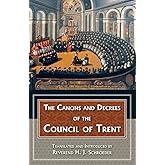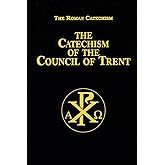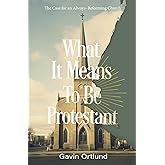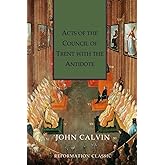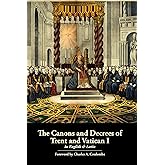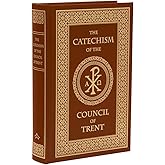
Download the free Kindle app and start reading Kindle books instantly on your smartphone, tablet or computer—no Kindle device required.
Read instantly on your browser with Kindle for Web.
Using your mobile phone camera, scan the code below and download the Kindle app.

Acts of the Council of Trent with the Antidote Paperback – 1 February 2024
You can select and apply an appropriate plan based on your cart value at checkout.
-
Pay at Your PaceZip
| Account type | Interest |
|---|---|
| Zip Pay | Always interest free^ |
| Zip Money | 12 mo interest free,
25.9% p.a. thereafter* |
^Zip Pay: This is a credit product and is interest free. Minimum monthly repayments are required. A monthly account fee of $9.95 is charged by Zip and is subject to change. Pay your closing balance in full by the due date each month and Zip will waive the fee. Available to approved applicants only and subject to completion of satisfactory credit assessment by Zip. Other charges may be payable. Fees and charges subject to change. Zip T&Cs apply. T&Cs available on application. See your Zip contract for further details. Credit provided by Zip Money Payments Pty Ltd (ABN 58 164 440 993), Australian Credit Licence Number 441878.
*Zip Money: Interest free term subject to minimum spend and promotional partner offer. Available to approved applicants only and subject to completion of satisfactory credit check. The repayment advertised will repay the transaction balance within the advertised interest free period. A monthly account fee of $9.95 applies and a one off establishment fee may apply for new customers. Under the contract, minimum monthly repayments are required and will vary depending on your credit limit. Instalment plans split eligible purchases of $300 and above into equal repayments within the interest free period. If you turn off instalments, transactions will be reverted to the minimum monthly repayment. Paying only the minimum monthly repayment may not necessarily repay a purchase within the interest free period. Any balance outstanding at the expiry of the interest free period will be charged at the standard variable interest rate, 25.9% per annum, as at 1 June 2023. Other charges may be payable, see T&Cs. Interest, fees and charges are subject to change. Terms & Conditions apply and are available on application. See your contract for further details. Credit provided by ZipMoney Payments Pty Ltd (ABN 58 164 440 993), Australian Credit Licence Number (441878).
Purchase options and add-ons
"Acts of the Council of Trent with the Antidote" by John Calvin is a critique of the Council of Trent, a significant 16th-century ecumenical council of the Roman Catholic Church. Calvin, a central figure in the Reformation, presents a vigorous theological argument against the Council's decrees and canons, asserting that they do not align with scriptural teachings and principles of Christian faith. He meticulously dissects the proceedings and decisions of the Council, arguing that they were influenced more by political and personal interests than by genuine spiritual guidance or biblical truth.
Calvin's work is notable for its rigorous analysis and its foundational role in Reformed theology. He challenges the authority of the Council by advocating for the supremacy of the Scriptures in guiding Christian doctrine and practice. By doing so, Calvin reinforces the Reformation's core tenets, including the doctrine of sola scriptura (Scripture alone) and the priesthood of all believers, emphasizing a return to the original and unadulterated teachings of Christianity as presented in the Bible.
- Print length208 pages
- LanguageEnglish
- Publication date1 February 2024
- Dimensions13.97 x 1.19 x 21.59 cm
- ISBN-101961807548
- ISBN-13978-1961807549
Frequently bought together
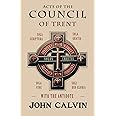
Customers who viewed this item also viewed
Product details
- Publisher : Monergism Books LLC
- Publication date : 1 February 2024
- Language : English
- Print length : 208 pages
- ISBN-10 : 1961807548
- ISBN-13 : 978-1961807549
- Item weight : 249 g
- Dimensions : 13.97 x 1.19 x 21.59 cm
- Best Sellers Rank: 880,667 in Books (See Top 100 in Books)
- 126 in Protestant Christian Theology
- 271 in Calvinist Christianity
- 303 in Catholic Theology
- Customer Reviews:
About the author

John Calvin (/ˈkælvɪn/; French: Jean Calvin, pronounced: [ʒɑ̃ kalvɛ̃]; born Jehan Cauvin: 10 July 1509 – 27 May 1564) was an influential French theologian, pastor and reformer during the Protestant Reformation. He was a principal figure in the development of the system of Christian theology later called Calvinism, aspects of which include the doctrines of predestination and of the absolute sovereignty of God in salvation of the human soul from death and eternal damnation, in which doctrines Calvin was influenced by and elaborated upon the Augustinian and other early Christian traditions. Various Congregational, Reformed, and Presbyterian churches, which look to Calvin as the chief expositor of their beliefs, have spread throughout the world.
Calvin was a tireless polemic and apologetic writer who generated much controversy. He also exchanged cordial and supportive letters with many reformers, including Philipp Melanchthon and Heinrich Bullinger. In addition to his seminal Institutes of the Christian Religion, Calvin wrote commentaries on most books of the Bible, confessional documents, and various other theological treatises.
Originally trained as a humanist lawyer, he broke from the Roman Catholic Church around 1530. After religious tensions erupted in widespread deadly violence against Protestant Christians in France, Calvin fled to Basel, Switzerland, where in 1536 he published the first edition of the Institutes. In that same year, Calvin was recruited by Frenchman William Farel to help reform the church in Geneva, where he regularly preached sermons throughout the week; but the governing council of the city resisted the implementation of their ideas, and both men were expelled.
At the invitation of Martin Bucer, Calvin proceeded to Strasbourg, where he became the minister of a church of French refugees. He continued to support the reform movement in Geneva, and in 1541 he was invited back to lead the church of the city.
Following his return, Calvin introduced new forms of church government and liturgy, despite opposition from several powerful families in the city who tried to curb his authority. During this period, Michael Servetus, a Spaniard regarded by both Roman Catholics and Protestants as having a heretical view of the Trinity, arrived in Geneva. He was denounced by Calvin and burned at the stake for heresy by the city council. Following an influx of supportive refugees and new elections to the city council, Calvin's opponents were forced out. Calvin spent his final years promoting the Reformation both in Geneva and throughout Europe.
In March 1536, Calvin published the first edition of his Institutio Christianae Religionis or Institutes of the Christian Religion.[15] The work was an apologia or defense of his faith and a statement of the doctrinal position of the reformers. He also intended it to serve as an elementary instruction book for anyone interested in the Christian faith. The book was the first expression of his theology. Calvin updated the work and published new editions throughout his life. (wikipedia).
Customer reviews
- 5 star4 star3 star2 star1 star5 star100%0%0%0%0%100%
- 5 star4 star3 star2 star1 star4 star100%0%0%0%0%0%
- 5 star4 star3 star2 star1 star3 star100%0%0%0%0%0%
- 5 star4 star3 star2 star1 star2 star100%0%0%0%0%0%
- 5 star4 star3 star2 star1 star1 star100%0%0%0%0%0%









